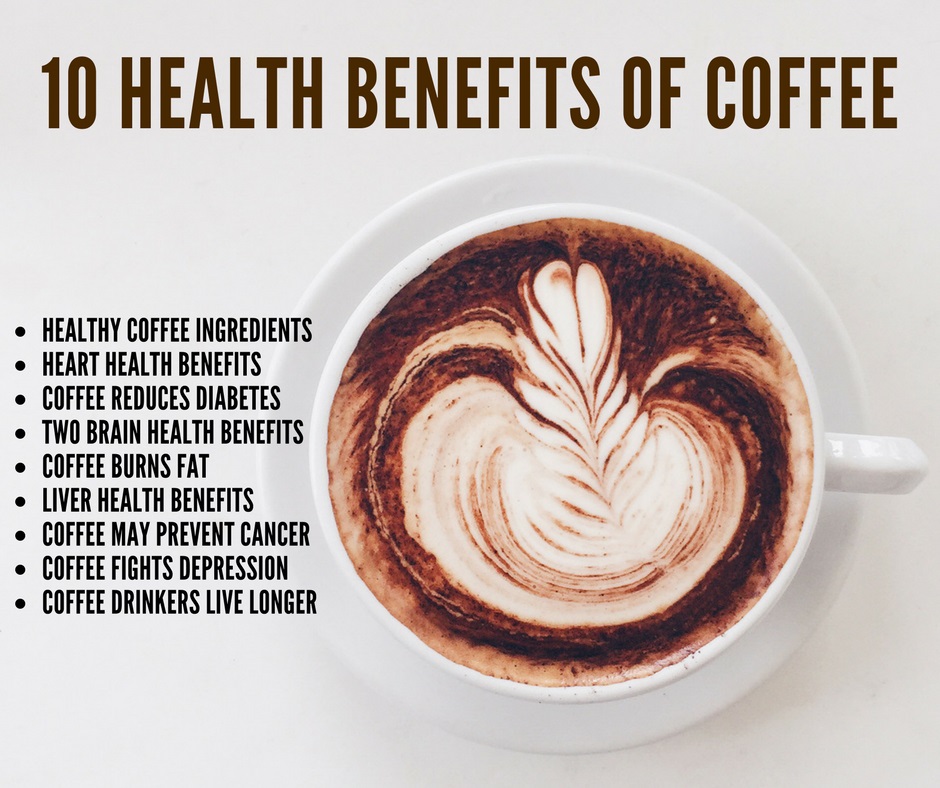10 Health Benefits Of Coffee
Summary: 10 health benefits of coffee – based on new research published in July 2017. The health benefits of coffee vary depending on how you prepare it: unfiltered or decaffeinated or regular. [Author: Brady Hartman. This article first appeared on the LongevityFacts.com website. Follow us on Reddit or Google+ ]
Coffee is a widely popular drink. While it has received a bad rap in the past, it is very healthy.
For people who eat a standard Western diet, coffee is the healthiest things we consume. That’s because coffee is loaded with plant nutrients and antioxidants. In fact, studies show that the average person gets more antioxidants from coffee than from fruits and veggies combined.
Research is uncovering new health benefits of coffee every day. Just last month two new research studies linked coffee with reduced rates of dying.
Studies show that coffee protects the heart, brain, and liver. Research shows that drinking the beverage prevents heart disease and reduces type 2 diabetes. With all these health benefits, coffee may be one of the keys to a long life.

Coffee Is Loaded With Healthy Antioxidants
Coffee is incredibly healthy. It is loaded with antioxidants, plant nutrients that fight the damage caused by free radicals. Additionally, coffee contains bioactive compounds that provide numerous health benefits. Most of these compounds are formed during the roasting process.
Bioactive Compounds in Coffee
Coffee contains about a thousand bioactive compounds, including caffeine, polyphenols, cafestol and kahweol, and most notably, chlorogenic acid (CGA). The amounts of these compounds in a cup of coffee vary, depending on factors such as the type of coffee beans, and how the beans are roasted.
- Caffeine – The main active ingredient in coffee, caffeine stimulates the central nervous system. Caffeine gives you an energy boost. It is also thought to ward off Parkinson’s diseases as explained in one of the following sections. Caffeine is the most commonly consumed psychoactive substance in the world.
- Polyphenols – Polyphenols are antioxidants that may benefit blood sugar metabolism and high blood pressure.
- Cafestol and Kahweol – Filtering removes many of these compounds. They are said to be good for the liver and protect against cancer, but a high intake may also raise LDL cholesterol. So there is no net health benefit to drinking unfiltered coffee.
- Chlorogenic Acids – CGAs provide most of the health benefits of coffee. Chlorogenic acids are potent antioxidants and anti-inflammatories that reduce the risk of stroke and heart attack. Additionally, chlorogenic acids have been shown to improve blood sugar regulation, improve memory, reduce diabetic neuropathy, and enhance rates of wound healing. In animal experiments, chlorogenic acids decreased blood glucose concentrations. CGAs also block glucose absorption in the intestines. Lastly, CGAs also reduce glucose output in the liver. As you’ll read later on, CGAs provide most of the health benefits of coffee.
Section Summary: Coffee is an incredibly healthy beverage packed with hundreds of biologically active compounds, including cafestol, kahweol, and of course caffeine. The main health benefits of coffee come from chlorogenic acids.

Heart Health Benefits of Coffee
Despite the previous bad press, studies show that coffee is actually healthy for your heart.
A large meta-analysis of over 1.2 million people evaluated people’s cardiovascular disease risk measured against their coffee consumption. Compared to non-coffee drinkers, people who drank an average of 1.5 cups per day had 11% reduction in their risk for cardiovascular disease while individuals who consumed an average of 3.5 cups per day had an overall 15% reduction in cardiovascular risk.
Reason for Coffee’s Heart Health Benefit
Polyphenols in coffee are known to have cardiovascular health benefits, especially improving endothelial dysfunction. The endothelium is the thin layer of cells that line the blood vessels. Endothelial dysfunction is a primary cause of high blood pressure and cardiovascular disease. The endothelium regulates blood pressure and blood flow throughout the body. Endothelial cells also produce nitric oxide and other biochemical signals which regulate the blood vessel’s ability to relax and dilate, in other words, to constrict and contract.
Bottom Line: Studies show that compounds other than caffeine provide the heart health benefits of coffee. Scientists believe the polyphenols in coffee are responsible.
Coffee Reduces Diabetes
Consuming coffee in moderate amounts is linked to a reduced risk of type 2 diabetes. Observational studies show that drinking either decaf or regular coffee significantly lowers the risk of getting type II diabetes. Regular coffee may be healthier than decaf.
Bottom Line: Two extremely large observational studies showed that the risk of developing type 2 diabetes dropped between 7% – 9%, for each additional cup of coffee consumed daily. People obtained the maximum health benefit of coffee by drinking 6 cups daily.
Regular coffee seemed to confer more benefit than decaf. If you’d like to learn more about how coffee prevents type 2 diabetes, it’s covered in the short report shown in the link.
Two Brain Health Benefits of Coffee
Coffee helps the brain. It has been shown to significantly reduce the risk of both Alzheimer’s and Parkinson’s diseases.
A large systematic review reported a 29% lower risk of Parkinson’s disease in people who drank three cups of coffee per day.
The data for Alzheimer’s disease is even better. Observational studies have associated regular, moderate coffee consumption with up to a 65% lower risk of getting Alzheimer’s.
Bottom Line: Consuming coffee in moderate amounts, around 3 cups daily, is linked to a reduced risk of both Alzheimer’s and Parkinson’s diseases. A more detailed explanation of the brain health benefits of coffee is covered in the short report shown in the link.
Coffee And Weight Loss
Caffeine is a principle ingredient of almost every commercial fat burning product because caffeine boosts metabolism which aids fat burning. While some research suggests that coffee might help you lose weight, experts differ greatly on whether the beverage is a dieter’s friend or foe.
Other researchers disagree. Some researchers found that coffee can increase your body’s leptin and worsen insulin resistance – factors will interfere with your attempts to control your weight. In fact, authors of this report stated that drinking too much coffee could be hazardous to your health.
Adding up the pluses and minuses, there is no solid evidence supporting coffee’s claims a weight-loss aid.
Bottom Line: Coffee is shown to have many health benefits, but losing weight isn’t one of them. Before you make up your mind on the weight loss aspect of coffee, be sure to read this article on the ways coffee sabotages a dieter’s efforts.
Liver Health Benefits of Coffee
The liver carries out hundreds of important functions in the body. Unfortunately, this vital organ is all the target of many diseases including fatty liver disease and hepatitis.
All of these diseases have one thing in common – they cause cirrhosis, a condition in which scar tissue has replaced the bulk of the liver.
It turns out that coffee may protect against cirrhosis of the liver. Some studies show that individuals who drink 4 or more cups per day have up to an 80% lower risk. This result, however, needs to be confirmed by stronger studies.
Bottom Line: Some studies suggest that regular coffee drinkers have a much lower risk of developing cirrhosis of the liver, but the result needs to be confirmed.
Coffee May Prevent Cancer
Cancer is a leading cause of death and major health concern. Among the many types, liver and colorectal cancer are the 3rd and 4th leading causes of cancer death.
Coffee has been shown to reduce the rates of two types of cancer – colorectal cancer and liver cancer.
In fact, studies show that coffee drinkers have up to a 40% lower risk of liver cancer.
One study of nearly half a million people found that those who drank 4-5 cups of coffee daily had a 15% lower risk of colorectal cancer.
Bottom Line: Take these two studies with a huge grain of salt. While cancer rates may have decreased, unfortunately, it didn’t translate into reduced cancer deaths. As discussed later on, a larger study found that coffee consumption lowered overall death rates, but didn’t lower cancer deaths.

Coffee Fights Depression
Another health benefit of coffee is … happiness.
An extensive study found that the caffeine in coffee helps chase away the blues.
In 2015, researchers performed a systematic review investigating coffee’s effects on depression. They searched through the databases, gathering the large research studies that examined the relationship between caffeine and depression. All in all, they collated twelve high-quality studies that evaluated nearly 347,000 individuals and 8,146 cases of depression.
The researchers averaged the data from the dozen individual studies and averaged the results. The researchers concluded that caffeine prevents depression. In fact, compared to those who didn’t drink the beverage, coffee drinkers were 24% less likely to become depressed.
Section Summary: Coffee chases away the blues. Observational studies show that coffee drinkers have reduced rates of depression.
Coffee Drinkers Live Longer
Given that coffee reduces the risk of several diseases, it makes sense that drinking coffee helps you to live longer.
Over the past half decade, at least three major studies have linked coffee consumption to a decreased risk of death. Most studies showed that drinking one cup a day reduces the risk of death somewhat while gulping 3 cups daily conferred the maximum benefit. The AARP -Freeman Study showed that people who drank several cups a day, had a 10-16% reduced risk of death depending on their sex and how many cups they drank. The EPIC Study published in 2017, also found that people who drank several cups a day had a 7-12% reduced risk of death depending on their sex. The participants of the MEC Coffee Study, also published in 2017, had a 12-18% reduced risk of death depending on how many cups they drank.
Bottom Line: While drinking only one cup a day reduces the risk of death, gulping 2 or 3 cups daily confers the maximum benefit and seems to reduce the risk of death, on average, by about 10%. The reduction in rates reported by the authors varies widely, depending on many factors: male vs female, Caucasian vs minority, even American vs European.
Side Effects of Coffee
- For some people, coffee’s benefits aren’t worth the side-effects. Coffee can give you heart burn, make you jittery, and cause sleep problems.
- Decaf is a happy compromise for those who are bothered by caffeine but still want the health benefits of coffee.
- Coffee has adverse effects on the body, including raising blood pressure and cholesterol levels as well as increasing insulin resistance.
- Caffeine is addictive. We all know not to bother someone until they’ve had their morning cup of coffee. Withdrawal symptoms can include depression, headaches, fatigue, and irritability.
- Doctors warn women who are pregnant or breastfeeding to limit their coffee consumption. These women should consume no more than two to three cups of coffee a day.
Instant Coffee’s Health Benefits
Instant coffee differs in nutrient content when compared to brewed. A linked companion article explains the health differences between instant coffee and brewed.
Take Home Message
All of the health benefits of coffee have been demonstrated by observational studies. These types of studies are considered to be weaker forms of evidence than randomized controlled trials. However, remember the oft-repeated maxim “correlation does not imply causation, but it sure is a hint.”
While coffee is not right for everyone, observational studies show the many health benefits of coffee, including:
- Coffee is loaded with healthy bioactive compounds.
- Caffeine gives an energy boost.
- Improves heart health.
- Reduces type 2 diabetes.
- Reduces Alzheimer’s disease.
- Reduces Parkinson’s disease.
- Fights depression.
- Coffee drinkers live longer.
Related Article: Boost the health benefits of coffee even further by adding a little cocoa powder. Read about the health benefits of chocolate and cocoa in this related article.
Help Us Spread The Word
Please help us spread the word about the health benefits of coffee by posting this article to your social media account. All it takes is one simple click on the share link on this page.
References
Arne Svilaas, Amrit Kaur Sakhi, Lene Frost Andersen, Tone Svilaas, Ellen C. Ström, David R. Jacobs, Jr., Leiv Ose, and Rune Blomhoff; Intakes of Antioxidants in Coffee, Wine, and Vegetables Are Correlated with Plasma Carotenoids in Humans; Journal of Nutrition 2004 134: 3 562-567. Available Online.
Jennifer Stella Bonita, Michael Mandarano, Donna Shuta, Joe Vinson. Coffee and cardiovascular disease: In vitro, cellular, animal, and human studies. Pharmacological Research. Volume 55, Issue 3, 2007, Pages 187-198, ISSN 1043-6618, http://dx.doi.org/10.1016/j.phrs.2007.01.006. Available Online.
E Thom. The Effect of Chlorogenic Acid Enriched Coffee on Glucose Absorption in Healthy Volunteers and Its Effect on Body Mass When Used Long-term in Overweight and Obese People; Journal of International Medical Research; Vol 35, Issue 6, pp. 900 – 908: June-25-2016; 10.1177/147323000703500620. Available Online.
Zhang, E.T. Lee, L.D. Cowan, R.R. Fabsitz, B.V. Howard; Coffee consumption and the incidence of type 2 diabetes in men and women with normal glucose tolerance: The Strong Heart Study; Nutrition, Metabolism, and Cardiovascular Diseases 21 (6), 2011, p.418; doi:10.1016/j.numecd.2009.10.020. Available Online.
Rachel Huxley, DPhil; Crystal Man Ying Lee, Ph.D.; Federica Barzi, Ph.D. Coffee, Decaffeinated Coffee, and Tea Consumption in Relation to Incident Type 2 Diabetes Mellitus – A Systematic Review With Meta-analysis. Archives Internal Medicine. 2009;169(22):2053-2063. doi:10.1001/archinternmed.2009.439. Available Online.
Nasira M Burkholder-Cooley, Sujatha S Rajaram, Ella H Haddad, Keiji Oda, Gary E Fraser, and Karen Jaceldo-Siegl; Validating polyphenol intake estimates from a food-frequency questionnaire by using repeated 24-h dietary recalls and a unique method-of-triads approach with 2 biomarkers; American Journal Clinical Nutrition. 2017 105: 685-694. Available Online.
Ming Ding, Ambika Satija, Shilpa N. Bhupathiraju, Yang Hu, Qi Sun, Jiali Han, Esther Lopez-Garcia, Walter Willett, Rob M. van Dam, Frank B. Hu; Association of Coffee Consumption With Total and Cause-Specific Mortality in 3 Large Prospective Cohorts; Circulation 2015 132: 2305-2315. Available Online.
Ming Ding, Shilpa N. Bhupathiraju, Mu Chen, Rob M. van Dam, Frank B. Hu. Caffeinated and Decaffeinated Coffee Consumption and Risk of Type 2 Diabetes: A Systematic Review and a Dose-Response Meta-analysis. Diabetes Care. February 2014. 37 (2) 569-586; DOI: 10.2337/dc13-1203. Available Online.
Grosso, G., Micek, A., Castellano, S., Pajak, A. and Galvano, F. (2016), Coffee, tea, caffeine and risk of depression: A systematic review and dose–response meta-analysis of observational studies. Molecular Nutrition and Food Research, 60: 223–234. doi:10.1002/mnfr.201500620. Available Online.
Freedman ND, Park Y, Abnet CC, Hollenbeck AR, Sinha R. Association of coffee drinking with total and cause-specific mortality. New England Journal of Medicine. 2012;366:1891-1904 [Data from AARP Diet and Health Study]. Available Online.
Park S, Freedman ND, Haiman CA, Le Marchand L, Wilkens LR, Setiawan VW. Association of Coffee Consumption With Total and Cause-Specific Mortality Among Nonwhite Populations. Annals of Internal Medicine [Epub ahead of print 11 July 2017] doi: 10.7326/M16-2472
Gunter MJ, Murphy N, Cross AJ, Dossus L, Dartois L, Fagherazzi G, et al. Coffee Drinking and Mortality in 10 European Countries: A Multinational Cohort Study. Annals of Internal Medicine. [Epub ahead of print 11 July 2017] doi: 10.7326/M16-2945. Available Online.
Disclaimer
1) Diagnosis, Advice, and Treatment: This article is intended for informational and educational purposes only and is not a substitute for professional medical advice. The information provided in this article should not be used during any medical emergency or for the diagnosis or treatment of any medical condition. A licensed physician should be consulted for the diagnosis and treatment of any and all medical conditions. Call 911, or the equivalent emergency hotline number, for all medical emergencies. As well, consult a licensed physician before changing your diet, supplement or exercise programs. 2) Photos, External Links & Endorsements: This article is not intended to endorse companies, organizations or products. Links to external websites, depiction/mention of company names or brands, are intended only for illustration and do not constitute endorsements.

another great article .. bit long. .. I bookmarked it and shared on facebook .. Thanks
Thank you – I appreciate the feedback
Big gap coffee drinkers live longer
You need to fix nearly all of the pics .. nice article .. well written
thanks for posting this
Well I must admit that you have put some effort into writing an amazing article.
I really appreciate your work mate.
Always a pleasure reading your articles, so Thanks for that.
One more thing.. the article is a bit long.. maybe u can shorten part about living longer .. move to another article